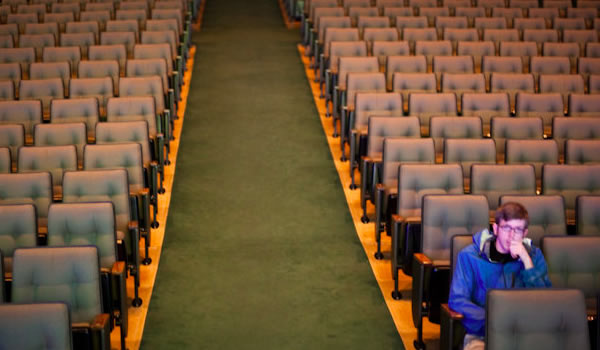Religion and Political Parties are Suffering from the Same Problem

 Alan Miller, Director of The New York Salon, wrote an article for CNN where he described spirituality among today's youth as a "cop-out." "Take a side," he says, with a stroke of over generalization and condescension for the younger generation. His view is no different than most partisan political consultants who generalize "independent voters" as being in the "middle" of everyone else and "uninformed" of the issues. The assumptions made by institutionalized religion and political parties see two sides: "Left and Right" or "Theism and Atheism."
Alan Miller, Director of The New York Salon, wrote an article for CNN where he described spirituality among today's youth as a "cop-out." "Take a side," he says, with a stroke of over generalization and condescension for the younger generation. His view is no different than most partisan political consultants who generalize "independent voters" as being in the "middle" of everyone else and "uninformed" of the issues. The assumptions made by institutionalized religion and political parties see two sides: "Left and Right" or "Theism and Atheism."
The "middle of the road" that Miller describes as spirituality seems to be an "agnosticism" that refuses to accept human inspiration:
Spiritual but not religious people are especially prevalent in the younger population in the United States, although a recent study has argued that it is not so much that people have stopped believing in God, but rather have drifted from formal institutions.
It seems that just being a part of a religious institution is nowadays associated negatively, with everything from the Religious Right to child abuse, back to the Crusades and of course with terrorism today.
Theirs is a world of fence-sitting, not-knowingess, but not-trying-ness either. Take a stand, I say. Which one is it? A belief in God and Scripture or a commitment to the Enlightenment ideal of human-based knowledge, reason and action? Being spiritual but not religious avoids having to think too hard about having to decide.
It must be true that some people sit on the fence because they haven't put the time in to decide which side to come down on. But it can't be true that all agnostics refuse to think hard, or that independent minded "youngsters" are simply know-nothings or lazy. The answer is in Miller's own observations. Our youth is weary of institutions, especially those that rely on negativity. Whether its the church telling us to condemn certain sinners or a political party that embraces an "us against them" philosophy, today's youth can't survive in such an antagonistic environment.
America's youth has grown up in a more integrated society where our opinions are shared on sites like Facebook and Twitter. Where an overzealous commitment to religious and political institutions is not conducive to diversity of opinion.
As a consequence, the narrow constructs of a rigid belief system, whether religious or political, are fading. It's not that our youth know nothing. It's not because they aren't trying. It's because the fences we sit on see over the walls our institutions have built around us.


